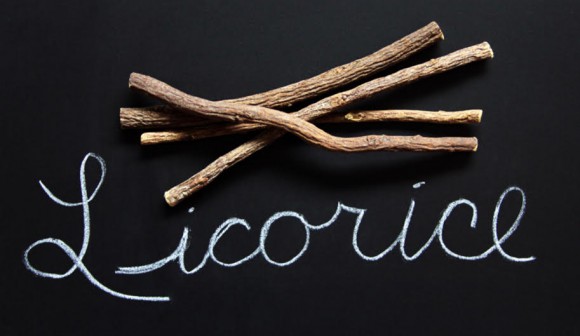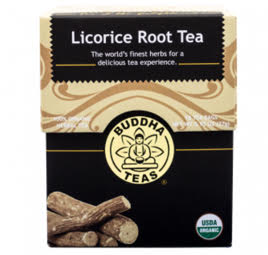 Licorice is one of the most widely used herbs and is a staple in Chinese herbalism. People throughout the world have been effectively treating a wide range of problems with it for thousands of years.
Licorice is one of the most widely used herbs and is a staple in Chinese herbalism. People throughout the world have been effectively treating a wide range of problems with it for thousands of years.
If you are feeling under the weather, you may be wondering about licorice for coughs and colds. This herb excels with these problems and there’s plenty of science and trustworthy endorsement to prove it does.
This article will look at all of that, as well as how to take and potential safety concerns.
It’s important to know a little about colds and coughs before you can effectively treat them, so we’ll start there.
A Billion Colds a Year
The common cold, which is an infection of the upper respiratory tract, is caused by 1 of 200 different viruses. The average American suffers from 3 colds a year and the average child gets around 9.
Colds are spread from person to person by coughing, sneezing or hand-to-hand contact. Once the virus is on your hand and you wipe your nose or rub your eyes, you catch the cold. Viruses can live on door knobs and counters too.
Common symptoms include:
- Pain in the muscles
- Cough
- Nasal congestion and runny nose
- Chills, fatigue, fever, or body aches
- Sinus pressure
- Headache
- Chest discomfort
- Throat irritation
When I start feeling a cold coming on, I make sure to have licorice close by.
Proof Licorice Works
In Germany, herbs are much more mainstream and doctors prescribe them all the time. Their version of the FDA, called Commission E, is the most respected government authority on herbs in the world.
They approve licorice for coughs, colds and sore throats. This root is found in many cough syrups in Europe too. This is because of a chemical found in licorice called glycyrrhetinic acid (GA) that has a broad range of healing powers, including cough suppressant properties.
GA stops the production of free radicals by acting as an antioxidant too. This helps boost your immune system and overall health.
Additionally, licorice contains antiviral compounds that release interferons, which are the body’s own antiviral constituents; this helps fight off colds.
Also, two components of licorice, licoricidin and glabridin, act as anti-inflammatories and reduce the swelling of the bronchial passageways. This makes it useful in cough, bronchitis and sore throats.
Lastly, this herb stimulates the secretion of mucus in the windpipe, which relieves dry cough.
It’s like Mother Nature specifically made licorice to help you when you get sick!
Different Ways To Take And Dosages
 There’s a few different ways to take licorice. It is really sweet and you can add a pinch of the powdered root to any other herbal tea to relieve cough and sore throat.
There’s a few different ways to take licorice. It is really sweet and you can add a pinch of the powdered root to any other herbal tea to relieve cough and sore throat.
To make a licorice tea, boil 1/2 teaspoon per cup of water for 10 minutes; strain if you wish.
You can buy licorice tea bags too. All you have to do is add a teabag to a cup of boiling water, cover and steep for 3 to 6 minutes. After, take the tea bag out and enjoy. You can drink up to 2 cups a day.
The extract is a very popular and convenient way to take herbs. The usual dosage is 10 to 20 drops in water or juice, a few times a day.
Safety Concerns
Licorice comes with a little controversy.
Most herbs come with very few side effects, especially compared to pharmaceuticals, and this is due to their mild nature. Usually, the only time you see problems is when way too much of the herb is taken.
This is the case with licorice. There have been cases where people have needed medical attention after taking absurd amounts of licorice candy. One person ended up in the hospital after eating 4 ounces everyday for 7 years.
Another person needed medical assistance after eating 1 pound of licorice candy everyday for 9 days straight.
Some people get too carried away and deem licorice unsafe based on these very rare cases of excessive consumption. Don’t let them scare you away from this helpful herb. When taken as recommended, and in moderation, you will be fine.
Still, you should familiarize yourself with the overdose symptoms, which include:
- Headache
- Facial puffiness
- Ankle swelling
- Weakness
- Lethargy.
The following people should not use licorice:
- Women who are pregnant or nursing
- Anyone with a history of diabetes
- Glaucoma
- High blood pressure
- Stroke or heart disease
To avoid problems, make sure to talk to your doctor before taking medicinal amounts.
Other Herbs To Help Fight Colds
If you can’t get your hands on licorice, the following herbs will bring you relief:
- Echinacea
- Garlic
- Ginger
- Goldenseal
- Marsh mallow
- Mullein
- Slippery elm
- Watercress
- Willow
- Valerian
- Ginseng
- Saw palmetto
- Vervain
There’s no shortage of cold fighting herbs, that’s for sure.
Are You Ready To Use Licorice?
Licorice is a must have for anyone needing a boost to their immune system and for those constantly suffering from colds and cough.
 If you are interested in this sweet root, I would like to suggest my two favorite suppliers of herbs, Starwest Botanicals and Buddha Teas. They both offer really high quality licorice products, which is extremely important for optimal results.
If you are interested in this sweet root, I would like to suggest my two favorite suppliers of herbs, Starwest Botanicals and Buddha Teas. They both offer really high quality licorice products, which is extremely important for optimal results.
If you are interested in browsing their licorice selection, click below:
Take A Look At High Quality Licorice Root
If you have any questions or want to share an opinion, comment below and I’ll respond as fast as possible. If you want to spread the message about licorice, share on social media for friends and family to see.
Thanks for reading!
